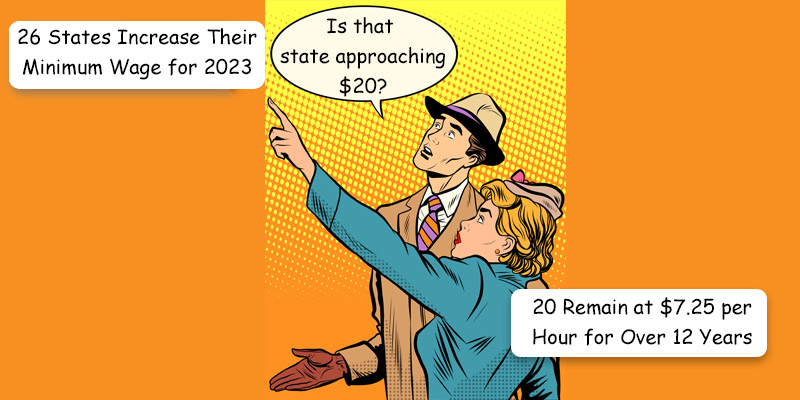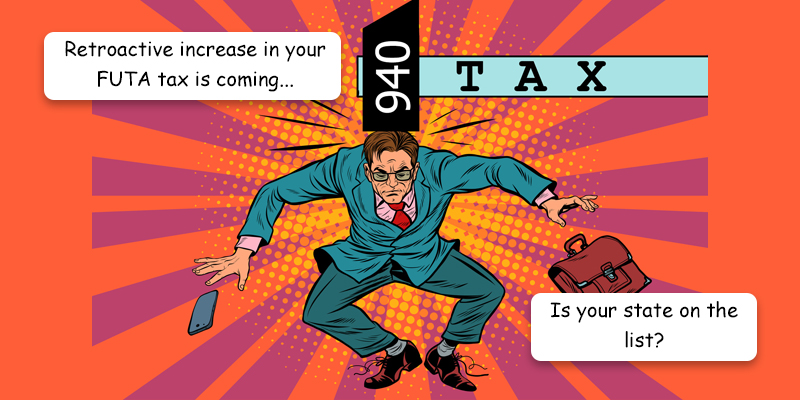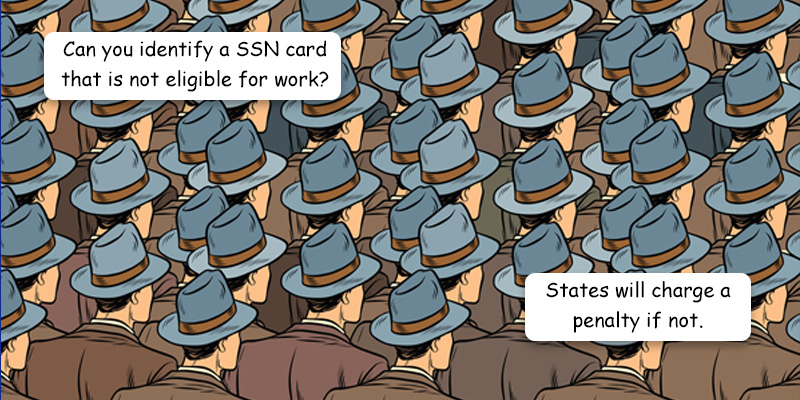Over the next few weeks, as your employees start to receive their 2022 W-2 form, they will most likely have many questions as to what all those numbers mean. For example, it is not uncommon for a salaried employee who earns $50,000 per year question why their Box 1 Wages only reflects $45,000. Did they get underpaid? Probably not. If the employee contributes to a pension plan (aka 401(k)) or has pre-tax insurance deductions, then those amounts reduces the “taxable” wage, which is what appears in Box 1. Some employees may also wonder why their Federal Income Tax withheld is…
Posts published in “Uncategorized”
For over a decade the Federal minimum wage remains at $7.25 per hour, but more than half the states and many cities, counties and locals have set increases effective January 1st, 2023 with a few announcing a change during 2023. The progress to $15.00 per hour marches on and a number of states and cities are now well beyond that. Areas in Washington state are even approaching $20.00 per hour. A list of each state/local that has announced a change in 2023, at the time of this publishing, along with the new hourly rate is listed below. Any state that…
Depending upon exactly what is being changed, your work may be cut out for you, and parts are often missed. Which is especially important when it comes to payroll. Let’s start with identifying what name is actually changing. A corporation or LLC has a registered name which can be indicated as such in the name of the business. That business may decide to operate under a different name to the public. This would be the doing business as (DBA) name, which some states will call a Fictitious Name or Trade Name. For example, Makin’ Money, Inc. can operate an ice…
I wrote an article over 3½ years ago about direct deposit fraud, first published in the FBI annual Internet Crime Complaint Center (IC3) report for 2018, when about 100 complaints were reported. Today, years later, we are finding it occurring on too-regular of a basis, and I would not be surprised if there were 100 complaints a day. How it occurs is the fraudster diverts an employee’s paycheck to their “bank account,” which they will then clear out as soon as the funds hit on pay day. The two questions you may be asking are ‘how do they change the…
Jury duty. It is something that many people dread being called for, but being summoned and responding is a civic duty and an honored privilege, critical to our judicial system. That can be an article all to itself, but today we will cover how the employer handles calls to jury duty by their employees. Employers are prohibited by state laws from terminating or penalizing an employee, in any way, who is called to serve on jury duty. Being laid off would certainly dissuade people from serving, so the states provide a bit of protection to the employee. If the employee…
Overtime. It is a subject that you may think you know well, but do you? It is not always a simple matter of paying the employee “time and a half” for any hours worked in excess of 40 hours in a workweek. There is much more to take into consideration, and while this article is not intended to cover every scenario out there, we will touch a number of bases. What we will not cover, this time around, is who may be exempt from overtime. Let’s start with the federal law, where the overtime provisions are contained in the Fair…
Under the provisions of the American Federal Unemployment Tax Act (FUTA), a federal tax is levied on employers covered by the Unemployment Insurance program at a current rate of 6.0% on wages up to $7,000 a year, paid to a worker. The law, however, provides a credit (basically a discount) against federal tax liability of up to 5.4% to employers who pay state taxes timely under an approved state UI program. Therefore, the employer pays an effective federal tax of 0.6% or a maximum of $42 per covered worker, per year. During times of high unemployment claims, a state may…
Over two decades ago, as a result of 9/11, President G.W. Bush signed the Uniting and Strengthening America by Providing Appropriate Tools Required to Intercept and Obstruct Terrorism (The PATRIOT) Act of 2001 into law. One purpose of the PATRIOT Act is to deter and punish terrorist acts in the United States and around the world by putting in measures to prevent, detect and prosecute money laundering and financial terrorism. One may ask themselves, what does this have to do with payroll? Plenty. The Act states that all individuals and organizations within the United States are responsible for ensuring that…
The last time I wrote about Social Security Numbers (SSNs) over four years ago, it was a fun and educational piece about the history of the SSN. You can check it out at this link: https://blog.paymaster.com/a-history-and-education-about-the-ssn/ These days, the SSN has become more important than ever, and it is of utmost importance to get it right. Of course, you should always get the SSN right for compliance with the Department of Homeland Security and the IRS, but that does not always happen. The filing of state employment and unemployment taxes has become more sophisticated over the recent years by utilizing…
We are finally getting back to a state of normalcy, so the experts say. Some are going back to their offices, others are getting back to their busy business travel schedules, while others have found that productivity has not been negatively affected by being remote and have made the decision to stay that way. One of the things people have enjoyed about working from home is having more time with their pets. Over the past two years, pet adoptions have increased tremendously for a litany of reasons. Some people were alone and needed companionship while others finally had the time…









